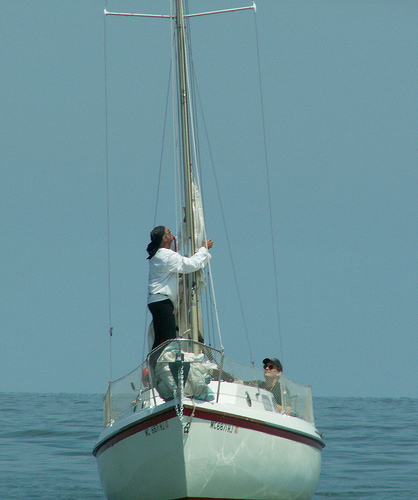The pessimist complains about the wind. The optimist expects it to change. The leader adjusts the sails. – John Maxwell, also attributed to William Arthur Ward

Are you sitting there complaining about the wind, waiting for it to change, or are you a leader, busy adjusting the sails?
What does that mean?
This is a fun quote, because it breaks the usual dichotomy of the glass is half full, glass is half empty paradigm. It adds a third choice to the mix. In this case, the ‘half empty’ complains. The ‘half full’ anticipates a better future. The third group does something about the situation.
While this is an example specific to sailing a ship, I believe it can be applied to our lives in general. You can complain, you can wait for things to get better, or you can get up off your butt and start doing something about the situation.
Not every situation can be salvaged. Some things will turn out badly. But there are few things that cannot be changed at least a little, if you are willing to work at it. Yes, you may still lose, but you might just be able to score a few points, if you work hard and smart.
Why is leadership important?
In this case, anyone can be a leader. It doesn’t fall on the official or designated leaders to do something. Anyone can step up and do their part. The world today is going through some rough times, politically, financially and militarily. We have designated leaders. How well is that going?
I’m not saying any one of us could do a better job, but we are each the captain of our own ship. You can do nothing and complain about how poorly things are going. You can do nothing and wait for the world to improve. Or you can do what you can to adjust the sails and improve your condition.
In this manner, you are the leader. You provide the example for your crew, however small that may be. And when your ship begins to move, the ships around you will start to wonder why the wind favors your boat. The smart captains will ask what you did. The best captains will do what you did. And in their imitation, you have become a leader.
Where can I apply this in my life?
I gave a very broad example in the sections above about the overall condition of the world, it’s economy, it’s relations, and it’s stability. Unless I happen to have the ear of a world leader, or an actor on the world stage, there is little you the reader can do to change that.
However, while each ship of state has a captain, so too does each family and each group of friends. What can you do to help? Will you cry in your beer or complain about headwinds? Will you sit there and wait for someone else to make the change for you?
Neither of those two options get anyone much of an improvement in their lives. The decision is fairly simple, you reject the dichotomy and select option three, adjust the sails. Now the question becomes what can you do to adjust your sails, to improve your condition or situation?
Take a moment and consider where in your life your ship is becalmed or suffering under adverse winds. Are you complaining about the wind, or hoping the wind changes and becomes favorable? Consider what you would have to do to break out of the dichotomy of inaction, and do something to adjust your sails.
Once you can see past the false choice between “half empty” and “half full,” you can begin to determine what actions you can take to fill the glass, or drink what is in it to sustain yourself while you work on getting yourself more to drink.
Take a look at your list and select one of the items on it as the one on which you are going to start. Start with figuring how you became trapped into the false choice between the two flavors of inaction. I consider this an important question, because it will help you avoid the trap in the future.
Once you have an idea how you got caught in the trap, consider how to avoid it next time. This may include changing what you believe about your ability to change your situation, or the inevitability of certain situations, or even your attitude. I have found this to be a very useful change to make.
Now all that remains is to determine where you want to go, and how you set your sails to best take advantage of the prevailing winds. While some might say that it’s impossible to make any headway in the current situation, it is useful to remember that some of the greatest fortunes were made in poor economic times.
Complaining and hoping are the two sides of the coin of inaction. No matter how many times you flip it, you are still stuck with those two choices, and in the mean time, nothing gets done. Be a leader, even if you are the only person on your dingy. Otherwise nothing will get done, and that’s rarely going to be the best option.
From: Twitter, @AR_Foundation
confirmed at : http://www.brainyquote.com/quotes/quotes/w/williamart110212.html
Photo by Cindy Funk

Pingback: Turning 5 Areas of Frustration into Focused Success | Hamilton Edwards, Inc.
As far as I can see there is nothing stopping the pessimist from not only complaining about the wind, but also at the same time hoping wind conditions will get better as well adjusting the sails accordingly? Besides, optimistically speaking, the ocean is twice as much as than half full!